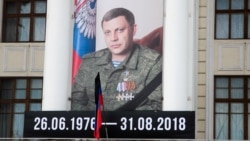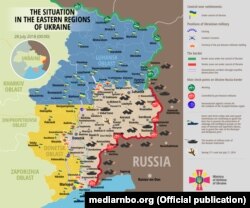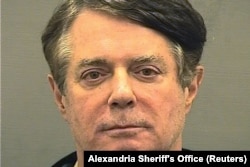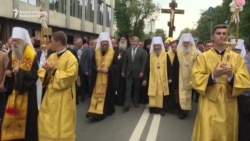Here is today's map of the security situation in eastern Ukraine, according to the National Security and Defense Council (CLICK TO ENLARGE):
On The Eve Of His Trial, A Deeper Look Into How Paul Manafort Elected Ukraine’s President
By Christopher Miller and Mike Eckel
Paul Manafort didn’t think very much of Viktor Yanukovych.
The longtime U.S. political consultant and lobbyist voiced serious misgivings in 2005 when he was brought on by several Ukrainian oligarchs to rehabilitate Yanukovych after his loss the previous year in Ukraine's presidential election to Viktor Yushchenko, amid mass protests known as the Orange Revolution.
"Yanukovych's designation as the candidate of the [previous Leonid Kuchma] Administration poisoned his appeal as much as the dioxin poisoned the body of Yushchenko,” Manafort wrote in a memo, referring to the mysterious poisoning that almost killed Yushchenko and badly disfigured him.
From the analysis set out in the previous section of this Report, the answer to the problem is clear -- Victor Yanukovych must be replaced.”-- Paul Manafort in a June 2005 memo
Fast-forward five years: Yanukovych wins the presidency of Ukraine, giving Manafort a feather in his cap and new work trying to burnish Yanukovych’s image in the West.
That effort, and the vast sums that Manafort was paid, are now in the crosshairs of the U.S. justice system and the politically explosive investigation of Special Counsel Robert Mueller.
Released as part of the court docket ahead of Manafort’s first trial on financial crimes, the Yanukovych memo is one of hundreds of pages of documents that offer a glimpse into Manafort's political wiles and give new dimension to a case that continues to rattle President Donald Trump’s presidency.
That concludes our live-blogging of the Ukraine crisis for Friday, July 27, 2018. Check back here tomorrow for more of our continuing coverage. Thanks for reading and take care.
Risks Rise As Sentsov's Hunger Strike Enters 75th Day, Lawyer Warns
The lawyer for Ukrainian filmmaker Oleh Sentsov, who is serving a 20-year prison term in Russia and has been on a hunger strike for nearly two months, says the health risks for his client are rising as the protest enters its 75th day.
Sentsov, a vocal opponent of Russia's 2014 annexation of Crimea, was sentenced in 2015 to 20 years for conspiracy to commit terrorism.
Sentsov is serving his term in Russia's northern region of Yamalo-Nenets after being convicted on terrorism charges that he and human rights groups say were politically motivated.
The 42-year-old denies the charges and has been on a hunger strike since mid-May, demanding that Russia release 64 Ukrainian citizens he considers political prisoners.
Sentsov's lawyer, Dmitry Dinze, told the Associated Press on July 27 that Sentsov is pale and lies down constantly because he has difficulty moving.
Dinze said "the hunger strike is continuing and with each day the risk is increasing."
The European Court of Human Rights this week urged Sentsov to end his hunger strike.
Sentsov's mother earlier this month sent a letter to Russian President Vladimir Putin asking him to pardon her son.
Kremlin spokesman Dmitry Peskov told reporters on July 13 that the letter from Sentsov's mother "will certainly be looked into," but did not comment on whether Putin might heed her request.
Several groups have called on Putin to pardon Sentsov, but Kremlin spokesman Dmitry Peskov told reporters the Ukrainian film director would have to ask for a pardon himself before it could be considered.
Sentsov has refused to request a presidential pardon because he considers himself innocent.
Based on reporting by AP, Ekho Moskvy, and Interfax
Russian Orthodox Church In Ukraine Marks Christianization Of Kyivan Rus
Tens of thousands of followers of the Russian Orthodox Church in Ukraine held a cross-bearing procession in Kyiv. The Ukrainian Orthodox Church of the Moscow Patriarchate, which led the annual march on July 27, says it wants to promote Ukraine's ties with Russia. The event was held under tight security following previous threats of violence from Ukrainian nationalist groups, who support the rival Kyiv-based Orthodox patriarchate. They see the procession as a provocation by Moscow. Another procession will be held on July 28 by the Ukrainian Orthodox Church of the Kyivan Patriarchate, which says it wants to promote Ukrainian national unity. Both events mark the conversion of Kyivan Rus, the forerunner of modern Russia, to Christianity.








